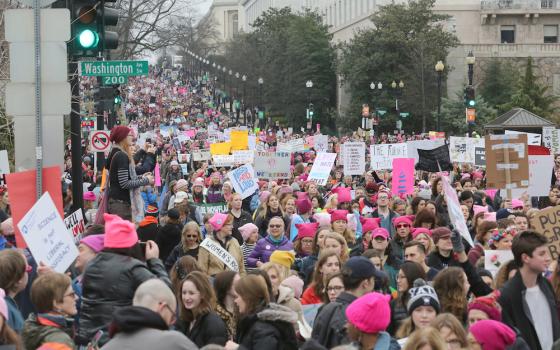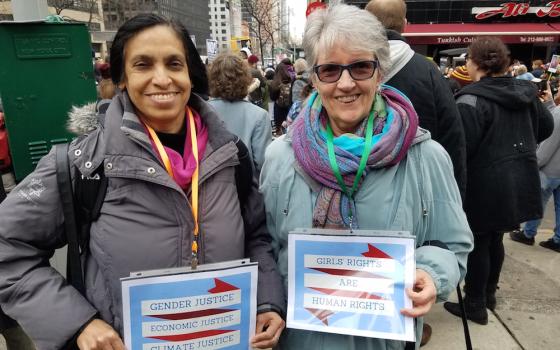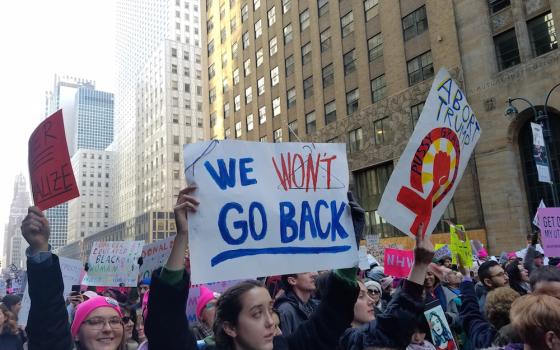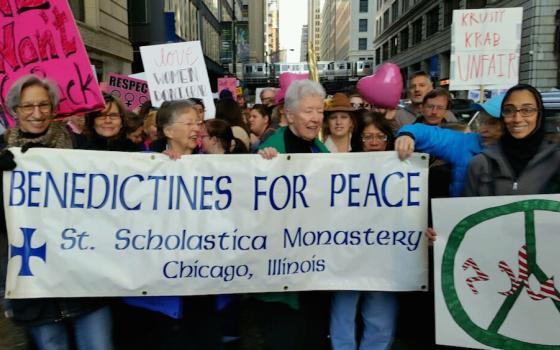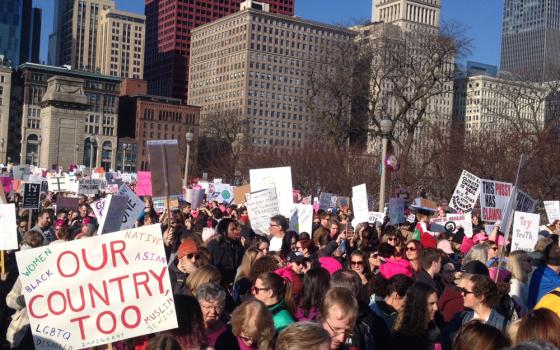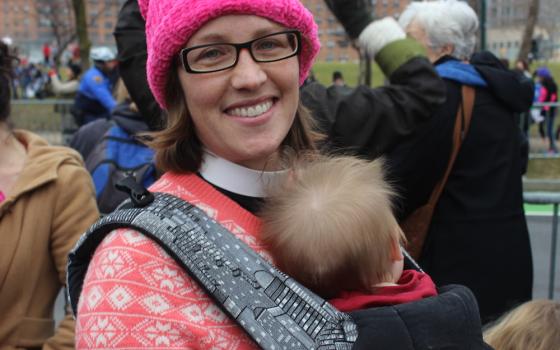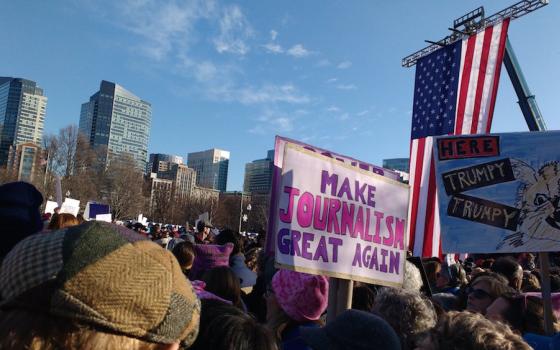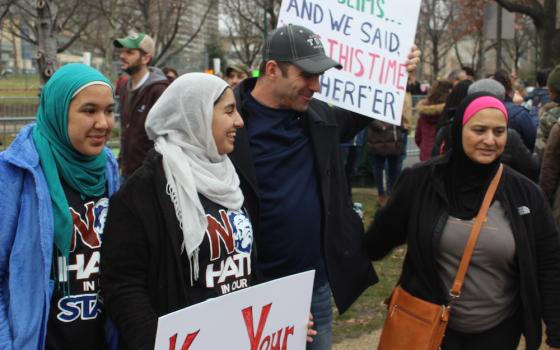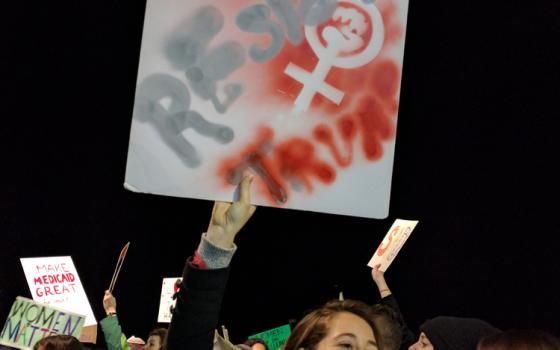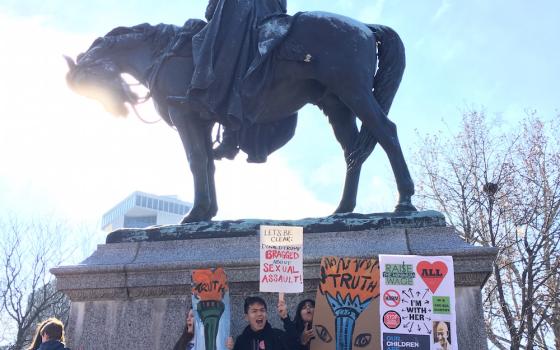Catholic women made sure their voices were heard among the millions who gathered at marches and rallies in cities and towns across the United States and around the world on January 21 to stand up for women's rights and send a signal to President Donald Trump the day after his inauguration about a wide range of issues, including immigration reform, health care and religious tolerance.
Crowds of more than 500,000 — about double what organizers had expected — jammed Washington, D.C., to the point that the march portion of the Women's March had to be abandoned and instead turned into a series of rallies and spontaneous mini-marches around the city.
In Boston, Chicago and dozens of other cities, crowds exceeded organizers' expectations.
Hundreds of women religious also joined the demonstrations and rallies, identifying with causes and issues that reflect their charisms and lifelong work. The Sisters of St. Joseph had a strong presence at the Women's March in Washington, D.C., with more than 130 sisters, associates, ministry partners, and friends and family making their voices heard.
A bus sponsored by the Sisters of St. Joseph of Brentwood, New York, filled quickly and had a 10-person waiting list, according to St. Joseph Sr. Helen Kearney, president of the congregation. Among the 53 attendees were sisters; co-ministers from their skilled nursing facility, day care center and literacy center; and clients from the literacy center.
The congregation's charism includes the values of unity and the empowerment of women. Kearney said she attended the march to communicate to political leaders "the values of inclusion, respect for diversity and the need to foster justice for all people."
In New York, the Women's March was an extension of the day-to-day work for the Catholic sisters who represent their congregations at the United Nations. Sr. Winifred Doherty, the United Nations representative of the Congregation of Our Lady of Charity of the Good Shepherd, and Sr. Celine Paramunda, the U.N. representative of the Medical Mission Sisters, wore placards proclaiming their commitments to girls' rights and gender justice, economic justice and climate justice and to girls' rights.
"These are all interrelated," Doherty said, and achieving them requires a change of consciousness that women can help bring about. Doherty said such events are necessary to challenge a male-dominated mindset that makes gender equality elusive and that continues to impoverish many women.
"Women in so many parts of the world don't have land rights, they don't have access to credit," she said. "We have to challenge that, challenge the power that is exercised over women."
Interviewed just before the march, the sisters said they would be unfazed by the signs proclaiming opposition to Trump, saying they were marching out of solidarity with fellow women.
Doherty, who is Irish, and Paramunda, who is Indian, emphasized the international character of the day's events, noting that marches were taking place in 33 countries. The march in New York City began at Dag Hammarskjold Plaza near the United Nations and ended not far from Trump Tower in midtown Manhattan. Manhattan Borough President Gale Brewer said the rally and march attracted 200,000 people.
Sr. Justine Gitanjali Senapati, the Congregations of St. Joseph's U.N. representative, said she was participating to affirm "the wisdom of women" and to counter what she said was "the hate in the world today."
"This is a march about who women are," she said, "and gives the world a message that all women have dignity and value."
Emphasizing the need for unity, some minority women religious said they didn't understand the sentiment expressed by some minority women to sit out the Washington march because it didn't represent their interests.
"We can't continue to stay divided," said Sr. Irma Dillard, a Religious of the Sacred Heart who traveled from San Francisco to Washington for the march.
Speaking at a pre-event gathering on January 20, Dillard said she had to come to the march to represent the elderly and poor she has served in her 30 years at Catholic Charities in the Bay Area. The fear among those populations is very real, she said.
"How are we going to change things if we don't come to the table together?" she asked. "It's not just a white woman thing. If it is, I'm not going to let it be because I am here."
Planned Parenthood's co-sponsorship of the march and the many signs supporting reproductive rights of women didn't dissuade sisters from participating. Only a very small percentage of Planned Parenthood's budget is used for abortions, said Sr. Teresa Shields, of the Sisters of the Holy Names of Jesus and Mary, whereas the majority is for health services and screenings that all women need.
"Of course we are not for abortion," she said. But the larger issues of justice and peace called to her to participate, regardless of Planned Parenthood's involvement.
"I want to stand with others who stand for the same things we do — dignity, respect, fairness," Mercy Sr. Anne Curtis said. "We're concerned these things we are committed to are at risk right now."
Planned Parenthood's sponsorship and the removal of a pro-life group from the list of march partners did cause her to reflect on her participation.
"I had hoped that Planned Parenthood and right-to-life groups could co-sponsor and all stand together because we stand for women," she said. Still, she decided to participate.
"Jesus dined with tax collectors and sinners" and those who religious authorities of his day indicated should not be associated with, she said, adding, "The only way to find common ground is to stand together."
In El Paso, Texas, pro-life and pro-choice advocates were side by side as the city's Women's March wove through the historic Segundo Barrio to the San Jacinto Plaza just a mile from the ports of entry at the U.S.-Mexico border.
Blustery weather did not keep people home. Marchers came from Mexico and New Mexico to express concern about policy changes in immigration, health care and education.
Sr. Janet Gildea, who attended the El Paso march, said she was surprised that in a culture that is characterized by machismo, there were a large number of men at the "Women's March."
"This signifies the realization that women's rights and concerns are human rights and concerns," she wrote in an email to GSR. As the group marched past Sacred Heart Jesuit parish and its prominent shrine to Our Lady of Guadalupe, Gildea said there was a strong sense of the solidarity of spirit in the border community and its history of resistance to injustice.
Indeed, many of the values expressed by marchers are consistent with Catholic teaching, many participants interviewed said.
"Love is the most important thing in the whole world," said Taylor Lach, a 21-year-old Loyola University student who attended the Women's March in Chicago.
"I feel like this is 100 percent of what the Catholic church teaches."
Lach joined approximately 250,000 other Chicago-area marchers. Marchers chanted slogans such as "Black lives matter" and "Si se puede. Yes we can." A crowd favorite was the call and response: "Tell me what democracy looks like. This is what democracy looks like."
After Trump's demeaning remarks toward Muslims during the election season, marchers made sure to speak up for them. Chicago participants chanted: "No hate, no fear. Muslims are welcome here."
Other marchers made sure the inclusive values of their religion made it on their protest signs.
"Christians for love, not hate" was on Kyri Sierra's sign. Sierra, 36, is a member of Chicago Tabernacle, a local Christian church.
"My husband and I are really disappointed in the voice Christians have had in this election," she said. "We don't feel it reflects the Christian point of view."
Kathleen Weiss Boyle, a 53-year-old parishioner at Queen of All Saints, a local Catholic church in Chicago, talked about her hope for the next four years.
"I'm looking for values that reflect Jesus ... I think the people that Donald Trump seeks to alienate are the people that Jesus would have drawn close to him," she said.
In Philadelphia, Sarah Weisiger, pastor of the Ivyland Presbyterian Church in Warminster, Pennsylvania, said the march "is consistent with my Christian values, and I wanted to do something positive." She attended the march with her husband, Alex, and their three children who range in age from 6 months to 5 years old, adding that she also wanted to expose her children to positive action.
Kristy Modarelli, a 34-year-old Catholic from Ohio still searching for a church home in the Philadelphia archdiocese, said she attended the march to express support for the causes she values, which include equality for women, equality for all marginalized people and action to remediate the effects of climate change.
"I'm really just showing up to be counted, to show how there's a massive number of people dissatisfied right now," she said.
Earlier in the week, organizers of the Women's March in Boston were expecting about 20,000 people at their march. Instead, more than 100,000 people showed up, organizers said Saturday afternoon.
Both of Massachusetts' senators, Sen. Elizabeth Warren and Sen. Ed Markey, spoke at the rally.
"We believe sexism, racism and homophobia have no place in this country. ... We believe equal means equal," Warren said.
The Boston crowd cheered the loudest when speakers brought up preserving education and protecting immigrants.
In St. Louis, Ann Compton Kammien, a co-member with the Loretto Community, said Saturday's march was a great opportunity "to demonstrate our frustrations with the presidential voice we are hearing now and possibly for the next four years."
The energy and commitment must continue, she said.
"We will not be silent. We will be strong in our work toward fair and generous treatment of all mankind and the earth we share," she said. "There will be a second strong and ongoing voice to balance and overcome what we are hearing from Donald Trump and his Cabinet."
About 500 people gathered in Tel Aviv, Israel, outside the U.S. embassy on Saturday night in reaction to Trump and his proposals.
Many demonstrators expressed concern over Trump's announcement that he plans to move the U.S. embassy from Tel Aviv to Jerusalem, a controversial plan that many fear could lead to violence in the region. Most countries have their embassy in Tel Aviv to avoid recognizing Jerusalem as the capital of Israel, since Palestinians also claim the city as the capital of their future state. Many people in the largely Israeli-American crowd said they had family members marching in the United States.
"It's an opportunity to really express a position to the Trump administration, that love trumps hate. Also, many Israeli-Americans don't support Trump, and certainly not most Jews," said Ayelet Shuber, one of the organizers of the event.
Overall, that the crowds came together to march regardless of race or creed sends a powerful message, said Social Service Sr. Simone Campbell, executive director of NETWORK, a national Catholic social justice lobby, who was one of the speakers at the Women's March.
As a Nun on the Bus, she said she and her fellow sisters "have traveled this nation, met many of you, but I must say I have never seen a sight like this: All of us together in one place."
Like at Pentecost, when the apostles of Jesus gathered in one place, frightened and afraid, until a mighty wind "lifted the courage and let people know we are not alone, we are together," she said. "We are together regardless of our faiths, regardless of the color of our skin, regardless of who we define as neighbor. We are all neighbors to each other, and that is the deep truth that our nation was founded upon: We are our sisters' keepers; we are our brothers' keepers. It is that truth that will help us to mend the gaps in our society. It is that truth that will get us to heal the economic divide where those at the top keep taking more than those who are working hard to generate their wealth."
Finding solidarity in numbers is important, said Kathy Tobin, a member of St. Joseph Parish in Pinole, California. She planned to attend the San Francisco Women's March because "it represents some way to join with others who oppose everything that Trump stands for. It's hard to think the marches will accomplish much directly, but I hope the sheer numbers of marchers will draw attention to the fact that there is a big force out there against the Trump agenda. Catholic teaching values the life of each person, and the new president's behavior in the past has shown him to be predominantly a bully with little regard for others, let alone those less fortunate," Tobin said.
In San Francisco, the Women's March followed another major event, the 13th Annual Walk for Life West Coast. An estimated 50,000 from throughout Northern California were expected to participate in the Walk for Life, with an equal number of participants expected a few hours later for the Women's March along the same 1.8-mile on the city's waterfront.
A news story in the San Francisco Chronicle said organizers of both events have been talking to one another to avoid conflict.
"We've been doing our march every year around now for 13 years, and this year was an odd coincidence," Eva Muntean of San Francisco, a Walk for Life organizer, told the Chronicle. "They put themselves on top of us, and we're not happy about it, but what can we do? We're in touch with them and trying to coordinate, even though we don't agree on views," Muntean said.
"We're certainly not planning any trouble." Martha Shaughnessy, an organizer for the city's Women's March, said there have been a series of trainings on peaceful protest for weeks for the Women's Marches planned in the Bay Area. "We've been at capacity each time, which is a very good sign," Shaughnessy said. "What we really want recognized here is that we're all facing the same sort of pressure and pain now. Creating pure empathy across all the issues is important."
Rosa King, a graduate of Sacred Heart Cathedral Preparatory in San Francisco and Santa Clara University, said in an interview that the Women's March is "a perfect example of Catholic teachings about social justice coming into action. We, as Americans, need to stand in solidarity with one another in order to make all of the needed positive changes that each one of us wants to see. The Women's March shows the world that we will not be divided and that every human life is sacred and should be treated with dignity and respect."
"I want my voice to be heard loud and clear that my life matters, as an Afro-Latina woman, an immigrant and a proud feminist," she said.
Sr. Cathy Cahur, 88 and a Sister of Charity of Cincinnati, was among those marching in San Francisco, where she has ministered as a substance abuse counselor for many years. She said the Women's March is aligned to her community's values of "working to witness to God's active, loving presence by choosing to act justly, build relationships, share our resources with those in need, and care for all creation. So I will march to offer my part to support God's vibrant, hopeful message."
*An earlier version of this story gave an inaccurate photo credit.
[These writers contributed to our coverage: Gail DeGeorge in Washington, D.C.; Monica Clark in San Francisco; Kristen Whitney Daniels in Kansas City, Missouri; Elizabeth Eisenstadt Evans in Philadelphia; Sr. Janet Gildea in El Paso; Chris Herlinger in New York City; Melanie Lidman in Tel Aviv; Jamie Manson in New York City; Sr. Mary Ann McGivern in St. Louis; Jennifer Mertens in Washington, D.C.; Heidi Schlumpf in Washington, D.C.; Claire Schaeffer-Duffy in Boston; Nicole Sotelo in Chicago; compilation and writing by Gail DeGeorge and Pam Hackenmiller.]
